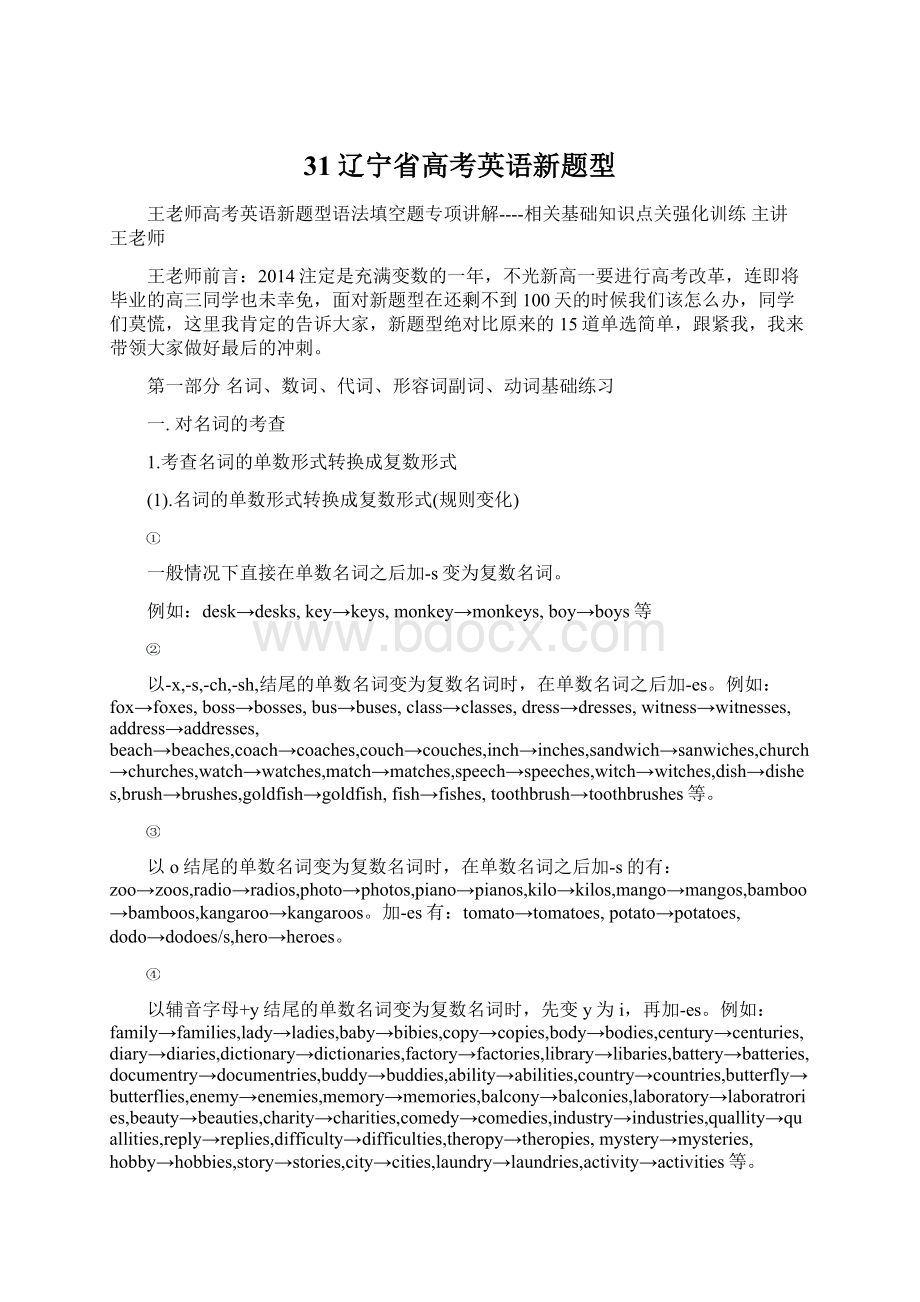31辽宁省高考英语新题型.docx
《31辽宁省高考英语新题型.docx》由会员分享,可在线阅读,更多相关《31辽宁省高考英语新题型.docx(37页珍藏版)》请在冰豆网上搜索。

31辽宁省高考英语新题型
王老师高考英语新题型语法填空题专项讲解----相关基础知识点关强化训练主讲王老师
王老师前言:
2014注定是充满变数的一年,不光新高一要进行高考改革,连即将毕业的高三同学也未幸免,面对新题型在还剩不到100天的时候我们该怎么办,同学们莫慌,这里我肯定的告诉大家,新题型绝对比原来的15道单选简单,跟紧我,我来带领大家做好最后的冲刺。
第一部分名词、数词、代词、形容词副词、动词基础练习
一.对名词的考查
1.考查名词的单数形式转换成复数形式
(1).名词的单数形式转换成复数形式(规则变化)
一般情况下直接在单数名词之后加-s变为复数名词。
例如:
desk→desks,key→keys,monkey→monkeys,boy→boys等
以-x,-s,-ch,-sh,结尾的单数名词变为复数名词时,在单数名词之后加-es。
例如:
fox→foxes,boss→bosses,bus→buses,class→classes,dress→dresses,witness→witnesses,address→addresses,beach→beaches,coach→coaches,couch→couches,inch→inches,sandwich→sanwiches,church→churches,watch→watches,match→matches,speech→speeches,witch→witches,dish→dishes,brush→brushes,goldfish→goldfish,fish→fishes,toothbrush→toothbrushes等。
以o结尾的单数名词变为复数名词时,在单数名词之后加-s的有:
zoo→zoos,radio→radios,photo→photos,piano→pianos,kilo→kilos,mango→mangos,bamboo→bamboos,kangaroo→kangaroos。
加-es有:
tomato→tomatoes,potato→potatoes,dodo→dodoes/s,hero→heroes。
以辅音字母+y结尾的单数名词变为复数名词时,先变y为i,再加-es。
例如:
family→families,lady→ladies,baby→bibies,copy→copies,body→bodies,century→centuries,diary→diaries,dictionary→dictionaries,factory→factories,library→libaries,battery→batteries,documentry→documentries,buddy→buddies,ability→abilities,country→countries,butterfly→butterflies,enemy→enemies,memory→memories,balcony→balconies,laboratory→laboratrories,beauty→beauties,charity→charities,comedy→comedies,industry→industries,quallity→quallities,reply→replies,difficulty→difficulties,theropy→theropies,mystery→mysteries,hobby→hobbies,story→stories,city→cities,laundry→laundries,activity→activities等。
f或fe结尾单数变为复数名词时先变f或fe为v再加-es。
half→halves,knife→knives,wife→wives,leaf→leaves,shelf→shelves,herself→themseves,scalf→scalfs/scalves,wolf→wolves等。
考例1:
Look!
Therearesome___(bird)flyinginthesky.
考例2:
Yourpresentisinoneofthe____.Canyouguess?
(box)
考例3:
Newspaperreportssaythatsomemore___(country)havebecomeE.U.(欧盟)membersthisyear.
考例4:
TheearthquakerockedthecitiesinthenorthofAlgeria.Manypeoplelosttheir____.(life)
(2).名词的单数形式转换成复数形式(不规则变化)
foot→feet,tooth→teeth,child→children,man→men,woman→women,policeman→policemen,policewoman→policewomen,Frenchman→Frenchmen,snowman→snowmen,businessman→businessmen,Englishman→Englishmen,gentleman→gentlemen,salesman→salesmen,mouse→mice/mouses(鼠标),sheep→sheep,Chinese→Chinese,Japanese→Japanese,fish→fish等。
考例1:
It’sgoodforustobrushour____(tooth)aftermeals.
2.考查名词的所有格考例1:
Chocolateisusually_____favouritefood.(child)
考例2:
Tomorrowis___(father)Day.Whatwillyoudoforyourdad?
注意:
母亲节为Mother’sDay,妇女节为Women’sDay,儿童节为Children’sDay,教师节为Teachers’Day。
3.考查名词转换成形容词
名词转换成形容词有以下几种情况:
(1)名词+y→形容词例如:
rain→rainy,wind→windy,cloud→cloudy,
sun→sunny,snow→snowy,fog→foggy,mist→misty,health→healthy,luck→lucky,unluck→unlucky,noise→noisy,fun→funny,thirst→thirsty等。
(2)名词+ful→形容词例如:
care→careful,thank→thankful,
help→helpful,use→useful,wonder→wonderful,colour→colourful,pain→painful,success→successful等。
(3).名词+n→形容词例如:
America→American,Russia→Russian,India→Indian,Australia→Australian,Canada→Canadian,Italy→Italian等。
(4).名词+ern→形容词例如:
east→eastern,west→western,north→northern,south→southern等。
(5).名词+ous→形容词例如:
danger→dangerous,fame→famous等。
注意:
friend→friendly,wool→woolen,difference→different,difficulty→difficult,importance→important,pride→proud,person→personal,safety→safe,confidence→confident等。
考例1:
Whata____(rain)day!
Wehavetostayathome.
考例2:
Toomuchhomeworkisreally____(pain)tostudents.
4.考查名词变为副词
success→successfully,care→carefully,care→carelessly,health→healthily,noise→noisily等。
考例:
Theyplayedso___thattheylostthefootballmatch.(care)
二.对数词的考查
1.考查基数词转换成序数词
基数词变为序数词时,一般情况下在基数词之后加-th。
例如:
four→fourth
但是,特殊的基数词变为序数词可用以下口诀来帮助记忆:
一、二、三单独记,八去t,九去e,五和十二记仔细,f来把ve替,ty变成tie,后面再加th。
即:
one→first,two→second,three→third,eight→eighth,nine→ninth,five→fifth,twelve→twelfth,twenty→twentieth,thirty→thirtieth,forty→fortieth,fifty→
fiftieth,sixty→sixtieth,seventy→seventieth,eighty→eightieth,ninety→ninetieth等。
考例1:
The___(eight)lessonisnotsoeasyastheninthlesson,Ithink.
考例2:
Wewillhavethe___celebrationforthereturnofHongKong.(nine)
考例3:
ThestudentsfromAmericaliveonthe____floor.(nine)
考例4:
LiuXianggotthe___(one)inhiscompetitionofthe2004OlympicGames.
2.考查分数词考例:
Two___(three)oftheboysinmyclassareintheschoolfootballteam.
三.对代词的考查
1.考查人称代词主宾格之间的转换(不常出现)。
2.考查物主代词之间的转换
考例:
YesterdayIwasdoingsomeshoppinginthesupermarketwhenImetafriendof___(my).
3.考查人称代词转换成自身代词
考例1:
Theclevergirlcouldteach____Englishwhenshewasten.(she)
考例2:
Thankstospacesatellites,theworld__(it)isbecomingamuchsmallerplace.
4.考查人称代词转换成物主代词
考例1:
Myschoolbagisdifferentfrom____(he).Mineisnewer.
考例2:
OurwayoflearningEnglishisalotbetterthan___.(they)
考例3:
_____(we)city,Huai’an,isZhouEnlan’shometown.Weareproudofhim.
考例4:
Thisismydictionary.Whereis___(you)?
四.对形容词的考查
1.考查形容词的比较级/最高级
(1).形容词比较级/最高级的规则变化
一般单音节的形容词在词尾加-er/-est例如:
black→blacker/est,bright→brighter/est
此外还有:
cheap,clear,clean,clever,cold,cool,dear,dark,deep,fast,few,full,great,green,hard,high,kind,light,long,low,near,new,old,poor,quick,quiet,rich,short,slow,small,steep,strong,sweet,tall,thick,yellow,young,warm,weak等。
以字母e结尾的形容词,只须在词尾加-r/-st。
例如:
blue→bluer/st,large→larger/st此外还有:
able,huge,late,nice,fine,free,white,wide,simple,safe,strange,polite,purple等。
以重读闭音节结尾的形容词,末尾只有一个辅音字母,要先双写这个辅音字母,再加-er/-est。
例如:
big→bigger/est,fat→fatter/est此外还有:
dim,red,thin,sad,wet,hot,glad等。
以辅音字母+y结尾的形容词,先把y变为i,再加-er/-est。
例如:
angry→angrier/est,easy→easier/est
此外还有:
busy,happy,heavy,empty,noisy,lucky,hungry,dirty,early,ready,sunny,windy,lazy,tidy,healthy,rainy,snowy,dry,unhappy,unlucky,pretty等。
多音节形容词和部分双音节形容词以及由分词转化来的形容词,须在词前加more/most。
例如:
beautiful→more/mostbeautiful,tired→more/mosttired
此外还有:
careful,interesting,difficult,different,dangerous,expensive,famous,important,interested,helpful,modern,useful,wonderful,worried,amazing,boring,serious等。
有些形容词的比较级和最高级的构成,既可以在词为加-er/est,又可以在词前加more/most。
例如:
clever,common,polite,quiet,peasant,simple等。
(2).形容词比较级/最高级的不规则变化
bad→worse→worstgood→better→bestmuch/many→more→mostlittle→less→least
考例1:
Ourteamwasmuch___(strong)thantheirs.Wewonthegameatlast.
考例2:
Themoreexerciseyoutake,the___you’llbe.(health)
考例3:
Housesinsomecitiesnowaremuch____thanbefore.(expensive)
2.考查形容词转换成副词
形容词+ly→副词
bad→badly,bright→brightly,certain→certainly,careful→carefully,careless→carelessly,clear→clearly,clean→cleanly,loud→loudly,polite→politely,quick→quickly,quiet→quietly,real→really,sad→sadly,safe→safelyslow→slowly,strong→strongly,usual→usually,wide→widely,angry→angrily,heavy→heavily,easy→easily,
happy→happily,silent→silently,lucky→luckily,sudden→suddenly,busybusilyexact→exactly,neat→neatly,noisy→noisily,successful→successfully,terrible→terribly,true→truly,等。
注意:
early→early,fast→fast,good→well等。
考例:
Becareful,oryouwon’tworkoutthephysicsproblem____.(easy)
3.考查形容词转换成名词参见“名词转换为形容词”
注意:
ill→illnessforeign→foreignerhigh→heighttrue→truth
考例:
Whenhesawtheboywasindanger,Edisonrushedoutandcarriedhimto__(safe).
五.对副词的考查
1.考查副词的比较级/最高级
(1).副词比较级/最高级的规则变化
一般单音节的副词在词尾加-er/-est例如:
fast→faster/est,hard→harder/est,long→longer/est,loud→louder/est,high→higher/est,soon→sonner/est
注意:
early→earlier/est
多音节副词和部分双音节副词,须在词前加more/most。
例如:
angrily→more/mostangrily此外还有:
quietly,quickly,sadly,slowly,widely,suddenly,happily,politly,clearly,often,carefully,carelessly,luckily等。
(2).副词比较级/最高级的不规则变化
well→better→best,badly→worse→worst,far→farther[further]/farthest[furthest]
考例:
MikeandIstartedtolearnpaintingatthesametime,butnowhecanpaintmuch____(good)thanI.
2.考查副词转换成形容词(不常见)
六.对动词的考查(时态语态,非谓语,情态动词,虚拟语气)
1.考查动词转换成名词
动词转换成名词常见的有:
(1).动词+er→名词
work→worker,teach→teacher,keep→keeper,paint→painter,sell→seller,speak→speaker,wait→waiter,clean→cleaner,play→player,surf→surfer,sing→singer,own→owner等。
(2).动词+r→名词
manage→manager,write→writer,dance→dancer,dive→diverdrive→driver,strike→striker等。
注意:
run→runner,swim→swimmer,travel→traveller,win→winner,rob→robber,cook→cook等。
(3).动词+or→名词visit→visitor,invent→inventor
(4).动词+(t)ion→名词invention,oprate→opration,discuss→discussion,pollute→pollution,
(5).动词+ing→名词
park→parking,mean→meaning,surf→surfing,train→training,shop→shopping,meet→meeting,turn→turning,cross→crossing,begin→beginning,build→building,clean→cleaning,draw→drawing,paint→painting,
swim→swimming,wash→washing等。
注意:
rob→robbery,please→pleasure,die→death,think→
thought,know→knowledge,appear→appearance,disappear→disappearance,dry→drought,fly→flight等。
考例1:
Someforeign___(visit)fromEnglandcametoourschoollastweek.
考例2:
Paulisthebestbasketball____(play)onschoolteam.
考例3:
WefeelsorrythatChenYifei,afamous___(paint),diedwhenhewasfifty-nine.
考例4:
Everychildhasadream.Mylifedreamistobeapop____(sing).
2..考查动词转换成形容词
动词转换成形容词一般都是转换成其相应的形容词化的过去分词或现在分词:
(1).动词+ing→形容词
interest→interesting,surprise→surprising,excite→exciting,miss→missing,relax→relaxing,amaze→amazing,move→moving,follow→following等。
(2).动词+(e)d→形容词
close→closed,hurry→hurried,worry→worried,crowd→crowded,please→pleased,interest→interested
surprise→surprised,frighten→frightened,use→used,break→broken等。
注意:
please→pleasant,enjoy→enjoyable,fill→full,
die→dead,sleep→asleep,wake→awake,forget→forgetful,open→open等。
考例1:
NomatterhowlongYinXuemeihasbeen___,herspiritofprotectingstudentsfromdangerwillalwaysliveon.(die)
考例2:
Youmaybe___ifyouareintroubleandhavenoonetohelpyou.(worry)
考例3IthinkEnglishisveryuseful.Areyou___(interest)init?
考例4:
Afterthestudytrip,Sallybecame____(interest)inthecultureofChina.
考例5:
Lilytoldusa____(surprise)pieceofnews.
考例6:
Hi